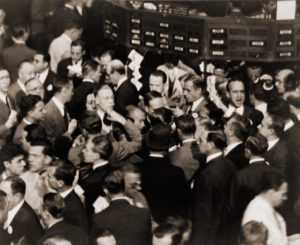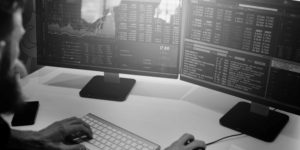
The Man Who Inspired Kate Bush and David Bowie: Dancer Lindsay Kemp Profiled
November 14, 2016
Top Wine Picks for Christmas and New Year
December 4, 2016Big Collective Wisdom, Bigger Profit Potential

Business sectionin newspaper concept. Focus on glasses under green light
Will collective intelligence help guide our investment decisions in 2017?
Kevin Regan introduces a unique experiment to find out.
THIS IS A PREVIEW OF THE DANTE PRINT MAGAZINE FOR DECEMBER 2016
MORE INFORMATION ON http://www.almanis.com/ and http://www.realworldcap.com and http://www.dysruptlabs.com/

Is it actually possible to predict the future?
Addressing this question in its purest form, the answer is no.
 There is, however, a body of evidence that suggests higher predictive outcomes are possible by tapping into a disciplined methodology known as collective intelligence – otherwise known as collective forecasting, or crowd wisdom.
There is, however, a body of evidence that suggests higher predictive outcomes are possible by tapping into a disciplined methodology known as collective intelligence – otherwise known as collective forecasting, or crowd wisdom.
Collective intelligence is the phenomenon of shared or group intelligence, emerging from the collaboration and competition of many and diverse individuals, ideally a fair number of them with relevant expertise. The individuals involved here are engaged in collective forecasting.
Each will contribute an insight that, when aggregated, provides a powerful signal – one subject to continuous change and which can collectively determine how likely a future event may be. Scientific studies demonstrate that this type of crowd wisdom produces better forecasts than surveys, partly because surveys do not have an updated feedback system. The basis and goal of collective intelligence is the mutual recognition and suitable incentivisation of these individuals.
 Pierre Lévy, the French philosopher, defines collective intelligence as “a form of universally distributed intelligence, constantly enhanced, coordinated in real time, and resulting in the effective mobilisation of skills, which could lead to very different forms of financial and other markets”.
Pierre Lévy, the French philosopher, defines collective intelligence as “a form of universally distributed intelligence, constantly enhanced, coordinated in real time, and resulting in the effective mobilisation of skills, which could lead to very different forms of financial and other markets”.
My firm, Realworld Capital, has recently entered into a collaborative joint venture with Dysrupt Laboratories Ltd dysruptlabs.com (“Dysruptlabs”), an Australian company specialising in the commercialisation of collective intelligence. Dysruptlabs is already providing collective intelligence services to the U.K. and U.S. governments.
 Together, Dysruptlabs and Realworld Capital are conducting an experiment that aims to explore the application of collective intelligence in attaining more accurate financial market forecasting. In order to achieve this, we require a large congregation of people to contribute their opinions on a series of questions.
Together, Dysruptlabs and Realworld Capital are conducting an experiment that aims to explore the application of collective intelligence in attaining more accurate financial market forecasting. In order to achieve this, we require a large congregation of people to contribute their opinions on a series of questions.
We would like to invite DANTE subscribers, as a group who represent an ideal cross section of educated and dynamic readership spread across the world, to join other selected groups in this experiment. The straightforward but potentially game-changing objective is to better forecast the most likely outcome and direction of key financial indices across FX, bond, equity, precious metal and commodity markets.
The realworldcap.com website posts its own proprietary financial market positions made across several asset classes, which are taken as either strategic long term holdings or tactical trading positions. Such transparency may allow users in this experiment to better assess their own views on market direction and related dynamics, in order to help form their own forecasts.
The collective intelligence domain for Dysruptlabs is called almanis. Visitors to Realworld Capital’s website will see a specific market-related question set alongside each proprietary market position. The question is also a hyperlink taking the user to the almanis website. Alternatively, users can visit www.almanis.com directly and select the collection of Realworld Capital questions.
 Dysruptlabs methodology seeks to harness the wisdom of crowds across an unlimited array of subjects and events, and often producing more accurate results than those emanating from other sources.
Dysruptlabs methodology seeks to harness the wisdom of crowds across an unlimited array of subjects and events, and often producing more accurate results than those emanating from other sources.
The U.S. government has a significant track record in applying collective intelligence to forecast matters in geopolitics, leading to a 30% to 70% improvement in situational accuracy as compared to other methods of estimation. This is consistent with recent literature which provides evidence that such platforms can outperform surveys, expert group consensus and management consultants.
The aim is to take complex information and boil it down to a straightforward probability of the most likely outcome; it is ultimately about the likelihood of things.
Realworld Capital will also closely monitor the crowd forecast trends, and continually assess whether these are verifying its own market positions and trade convictions, or should opposing signals develop, whether current market positioning should be revised. It will not be the only factor taken into consideration, but at times it could be the most influential.
 The aim is to achieve superior financial outperformance over short, medium and longer-term time horizons. Realworld Capital’s proprietary positions are centred on the big macro trends evident across all major financial asset classes.
The aim is to achieve superior financial outperformance over short, medium and longer-term time horizons. Realworld Capital’s proprietary positions are centred on the big macro trends evident across all major financial asset classes.
Current priorities include determining the key directional move for the U.S. dollar against the world’s other leading currencies; the near and long term trends for global government bonds and major equity indices, precious metals and key hard and soft commodities.
In Asia, we shall focus mainly on China and Japan, because their future will significantly shape ours. We are also, of course, closely monitoring the Brexit-sensitive financial market touchstones – sterling, gilts and U.K. equities.
Nothing is to be sold or subscribed to in this experiment. It is fully transparent, and all that is required is a high number of contributors, working towards establishing a unique crowd opinion. The larger and more diverse the crowd, which will also include seasoned financial-market practitioners, the better we are likely to be at forecasting.
The continually updated results on the almanis website are for everyone. The crowd can determine for each outcome whether they want to use them to influence their own investment views and decisions. However, all contributors should bear in mind that they could provide wrong signals – and that acting on them could lead to real losses in investors’ portfolios.
Appropriate disclaimer notwithstanding, we are excited to see what happens next and we would be excited if you decide to follow and contribute to its progress.

2016 in review
The year 2016 is likely to go down as a relatively benign investment year with decent returns for acceptable levels of market-related risk.
 In a series of articles for DANTE throughout this year, I looked to take a common-sense approach to managing my own investment decisions. Key to this was recognising that several equity sectors – energy and commodities in particular – were oversold at the beginning of 2016 and potentially held great investment value. We recorded our decisions in earlier DANTE editions where we decided to buy these stocks.
In a series of articles for DANTE throughout this year, I looked to take a common-sense approach to managing my own investment decisions. Key to this was recognising that several equity sectors – energy and commodities in particular – were oversold at the beginning of 2016 and potentially held great investment value. We recorded our decisions in earlier DANTE editions where we decided to buy these stocks.
Headline investment decisions this year also included a recommendation to diversify out of sterling and to build at least a modest position in gold through investing in both physical gold and gold mining stocks. For currency diversification, we decided to move into U.S. dollars, although we’re aware that many people elected to move more of their currency assets away from sterling into euros.
Clearly though, we are very interested to see if collective intelligence can positively help guide our ability to sense better the direction of travel across all major market indices.
And so to markets in 2017
For sterling-based investors, if you didn’t diversify out of sterling either before or immediately following the referendum, a little more caution in doing so at current levels may be advisable. At the time of writing the pound is trading around 1.21 to the U.S. dollar and 1.11 to the euro.
 Sterling’s current value is already discounting a lot of bad news, which hasn’t actually happened yet. In addition to reflecting clear political risk, sterling’s current level is on the way to adjusting for the drag of U.K.’s large current account deficit. Taking a stance on either sterling or the euro now is admittedly a punt on the next round of political moves by both the U.K. government and the dynamic elements in play across Europe.
Sterling’s current value is already discounting a lot of bad news, which hasn’t actually happened yet. In addition to reflecting clear political risk, sterling’s current level is on the way to adjusting for the drag of U.K.’s large current account deficit. Taking a stance on either sterling or the euro now is admittedly a punt on the next round of political moves by both the U.K. government and the dynamic elements in play across Europe.
 Four major referendums and elections in Italy, France, Netherlands and Germany will all occur within the next 12 months. Half the peoples of Europe will have the opportunity for their voices to be heard. If there is a serious crack in support for the current EU model, then the relative values for the major world currencies could change – and I really do mean this literally – in a heartbeat.
Four major referendums and elections in Italy, France, Netherlands and Germany will all occur within the next 12 months. Half the peoples of Europe will have the opportunity for their voices to be heard. If there is a serious crack in support for the current EU model, then the relative values for the major world currencies could change – and I really do mean this literally – in a heartbeat.
In the U.K., there are huge risks remaining. Inflation will pick up here, and we all need to know if the U.K. government really has a Brexit strategy to implement in the first quarter of 2017. These things really matter right now.
 Further devaluation, should it happen, may well support the U.K. stock market for a while longer, but watch carefully rising gilt yields and related price and yield moves for all global government bonds. Rising bond yields will exert downward pressure on every single other asset class.
Further devaluation, should it happen, may well support the U.K. stock market for a while longer, but watch carefully rising gilt yields and related price and yield moves for all global government bonds. Rising bond yields will exert downward pressure on every single other asset class.
 Gold, which is also prone to downward pressure from rising bond yields, nevertheless will still maintain a crucial role in any portfolio, particularly for U.K. based investors.
Gold, which is also prone to downward pressure from rising bond yields, nevertheless will still maintain a crucial role in any portfolio, particularly for U.K. based investors.
The developed world’s GDP growth prospects outside emerging markets will almost certainly remain benign in 2017, with debt levels maintaining stubbornly high ratios to GDP output. Because of this, we have our eyes firmly on opportunities in emerging markets in selected countries and sectors. These markets could act as a home for the huge amounts of loose capital that is currently snaking around world financial markets.
 In our next update, we will have made our early 2017 investment decisions and I look forward to sharing them with you. Meanwhile, we very much look forward to you visiting the Realworld Capital and almanis websites and becoming part of our great experiment.
In our next update, we will have made our early 2017 investment decisions and I look forward to sharing them with you. Meanwhile, we very much look forward to you visiting the Realworld Capital and almanis websites and becoming part of our great experiment.
Kevin Regan is Managing Director of Realworld Capital Management Ltd.
MORE INFORMATION ON http://www.almanis.com/ and http://www.realworldcap.com and http://www.dysruptlabs.com/




